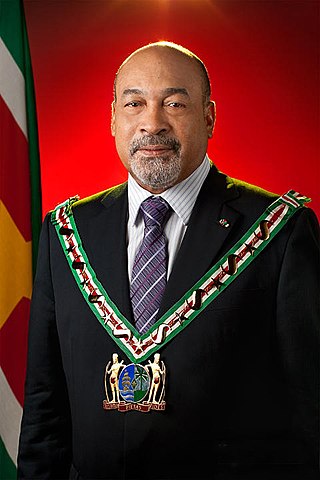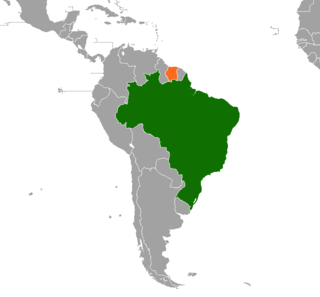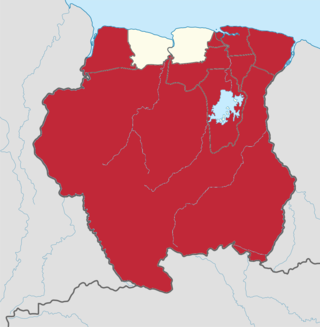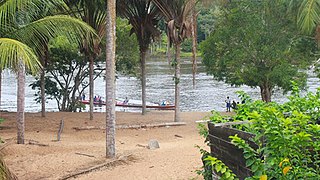Related Research Articles

Desiré Delano Bouterse is a Surinamese military officer, politician, convicted murderer and drug trafficker who served as President of Suriname from 2010 to 2020. From 1980 to 1987, he was Suriname's de facto leader after conducting a military coup and establishing a period of military rule. In 1987, Bouterse founded the National Democratic Party (NDP). On 25 May 2010, Bouterse's political alliance, the Megacombinatie, which included the NDP, won the parliamentary elections, and on 19 July 2010, Bouterse was elected as President of Suriname with 36 of 50 parliament votes. He was inaugurated on 12 August 2010.

The Paramaccan or Paramaka are a Maroon tribe living in the forested interior of Suriname, mainly in the Paramacca resort, and the western border area of French Guiana. The Paramaccan signed a peace treaty in 1872 granting the tribe autonomy.
The Kwinti are a Maroon people, descendants of runaway African slaves, living in the forested interior of Suriname on the bank of the Coppename River, and the eponymous term for their language, which has fewer than 300 speakers. Their language is an English-based creole with Dutch, Portuguese and other influences. It is similar to the languages spoken by the Aluku and Paramaccan Maroons, and split from Sranan Tongo in the middle 18th century. The Kwinti had a population of about 300 in 2014 and adhere to the Moravian Church.
Kawemhakan, formerly also known as Anapaikë, is a Wayana village in the Sipaliwini District of Suriname. The village lies on the banks of the Lawa River, which forms the border with French Guiana.

Pokigron is a town in Suriname located on the Upper Suriname River near the Brokopondo Reservoir. It is located in the Boven Suriname municipality (resort) in the Sipaliwini District. It has a population of approximately 400 people in 2018. Pokigron is located at the end of a paved road via Brownsweg to the Afobakaweg. Pokigron is often referred to as Atjoni which is the nearby quay, and literally the end of the road. Villages to the South of Pokigron have to be accessed by boat. The village is home to Maroons of the Saramaka tribe.

The Surinamese Interior War was a civil war waged in the Sipaliwini District of Suriname between 1986 and 1992. It was fought by the Tucayana Amazonas led by Thomas Sabajo and the Jungle Commando led by Ronnie Brunswijk, whose members originated from the Maroon ethnic group, against the National Army led by then-army chief and de facto head of state Dési Bouterse.

The Ndyuka people or Aukan people (Okanisi), are one of six Maroon peoples in the Republic of Suriname and one of the Maroon peoples in French Guiana. The Aukan or Ndyuka speak the Ndyuka language. They are subdivided into the Opu, who live upstream of the Tapanahony River in the Tapanahony resort of southeastern Suriname, and the Bilo, who live downstream of that river in Marowijne District

Ronnie Brunswijk is a Surinamese politician, businessman, former rebel leader, footballer and convicted drug trafficker, who is serving as the current Vice President of Suriname.

Chandrikapersad "Chan" Santokhi is a Surinamese politician and former police officer who is the 9th president of Suriname, since 2020. After winning the 2020 elections, Santokhi was the sole nominee for president of Suriname. On 13 July, Santokhi was elected president by acclamation in an uncontested election. He was inaugurated on 16 July.

Brazil – Suriname relations refer to the bilateral relations between the Federative Republic of Brazil and the Republic of Suriname. Diplomatic relations were established on 3 March 1976. Brazil has an embassy in Paramaribo since the independence of Suriname on 25 November 1975. Suriname has an embassy in Brasília since 1976, and a consulate in Belém since 2012.
Belfon Aboikoni was granman of the Saramaka maroons in Suriname. Aboikoni was sworn in as chief of the Saramaka, one of Suriname's Maroon peoples, in October 2005 at the age of 65. He succeeded the late chief Songo Aboikoni who died two years earlier. Belfon Aboikoni focused on land rights during his time as chief.

Michael Ashwin Satyandre Adhin is a Surinamese educator, politician, and was the Vice President of Suriname between 2015 and 2020. He is a member of the National Democratic Party. At the age of 35, he became the youngest vice president in the history of Suriname to lead the Council of Ministers. Adhin is a Hindu of Indian descent.

Granman is the title of the paramount chief of a Maroon nation in Suriname and French Guiana. The Ndyuka, Saramaka, Matawai, Aluku, Paramaka and Kwinti nations all have a granman. The paramount chiefs of Amerindian peoples in Suriname are nowadays also often called “granman”.

The COVID-19 pandemic in Suriname was caused by Severe acute respiratory syndrome coronavirus 2. The virus was confirmed to have reached Suriname on 13 March 2020. The case was a person who travelled from the Netherlands the previous week. On 3 April 2020, one person died. On 3 May 2020, all nine cases had recovered. On 18 May, an eleventh case was identified.

Pikin Slee is a village on the Upper Suriname River in the resort Boven Suriname of the Sipaliwini District. It is home to about 3,000 people, and the second largest village of the Saramaka Maroons, after Aurora.

Diana Marilva Pokie is a Surinamese politician. She was the assembly member from Brokopondo for the Brotherhood and Unity in Politics (BEP) before she was expelled. She returned to the assembly as the Brokopondo member representing the General Liberation and Development Party (ABOP) party. She became the first female vice-chairman of that party in 2019. On 16 July 2020, Pokie became Minister of Land and Forest Management. On 3 August 2021, Pokie was replaced by Dinotha Vorswijk.

Asongo Alalaparu, also Ashongo Alalaparoe, was a Granman of the indigenous Tiriyó people in Suriname. He led the Tiriyó from 1997 to 2021 from his residence in Kwamalasamutu. During his rule, the Tiriyó established new small villages in the interior of Suriname.

Jupta Lilian Itoewaki is a Wayana activist and politician from Suriname. Since 2018, she has been the founding president of Mulokot, an organisation representing the interests of the Wayana people. She had previously worked from 2010 with groups focused on preserving the culture and habitat of indigenous Surinamese.

Karin B. Refos is a Surinamese former model, entrepreneur, and public speaker on child welfare and women's rights. She founded the brand consultancy STAS International.

The 2022 Suriname floods beginning in March have affected Indigenous and Maroon settlement areas in the eastern part of Suriname. The floods were caused by the La Niña weather phenomenon, which replaced the short dry season in 2022.
References
- 1 2 Goldman Prize, Wanze Eduards & Hugo Jabini, 2009
- 1 2 Christine F. Samsom, His/Her Tori over grondenrechten in Suriname, 2014
- ↑ AdeKUS, Het Surinaams versus het Saramakaans rechtsysteem: een rechtsvergelijkend onderzoek betreffende rechten op de grond, 2014
- ↑ "Both ENDS: Wat verwacht VSG uit Suriname van Rio+20?".
- ↑ Starnieuws, Surinaamse staat onder druk om Saramakka-vonnis, March 24, 2010
- ↑ Merel de Koning, Vechten voor grond, One World, November 29, 2017
- ↑ DNA, Gewezen leden 2010 - 2015
- ↑ Waterkant, Marrons Suriname bezorgd over integratieplan, November 6, 2010
- ↑ Waterkant, Saramaccaners geven regering Suriname meer tijd, December 20, 2010
- ↑ Starnieuws, Regering scoort magertjes bij Hugo Jabini, August 12, 2012
- ↑ Dagblad Suriname, Conceptkaart grondgebied Samaaka afgerond, August 30, 2012
- ↑ Dagblad Suriname, Begrenzing Samaaka-gebied in afrondende fase, February 13, 2013
- ↑ Waterkant, ‘Suriname schendt Samaaka-vonnis met gouddeal’, May 20, 2013
- ↑ Starnieuws, 'Vaststellen Saramacaans woongebied, geen afscheiding', May 27, 2013
- ↑ Waterkant, Parlementariërs binnenland ‘bang voor confrontatie’, May 27, 2013
- ↑ Dagblad Suriname, Jabini stelt vertrouwen in regering bij uitvoering Samaaka-vonnis, June 7, 2013
- ↑ Dagblad Suriname, Wise-Redd+ eindigt in verrassende tribale bundeling, April 3, 2016
- ↑ Starnieuws, Jabini oneens met meerderheid Staat adviescommissie, August 21, 2013
- ↑ Dagblad Suriname, Opstapcursus in Sipaliwini Afgesloten, May 30, 2012
- ↑ Starnieuws, Alle scholen Boven Suriname betrokken bij naschoolse opvang, October 29, 2012
- ↑ Starnieuws, Onderwijs stuurt toezicht voor opvang scholieren Atjoni, February 28, 2013
- ↑ Starnieuws, Pokigron en Atjoni radeloos door gebrek aan elektriciteit, July 16, 2013
- ↑ Starnieuws, Saamakafonds stelt SRD 24.000 beschikbaar voor internaat, October 17, 2013
- ↑ Dagblad Suriname, Voordragen van 'granman' moet volgens juiste principes, October 6, 2014
- ↑ Dagblad Suriname, HI opent dependance te Atjoni, November 18, 2014
- ↑ Starnieuws, Jabini weet niet waarom hij niet gekandideerd is, April 8, 2015
- ↑ Suriname Herald, Hugo Jabini ontevreden over aanpak grondrechtenvraagstuk, February 23, 2015
- ↑ Suriname Herald, WISE-REDD+ project leidt tot MOU tribale volkeren, April 1, 2016